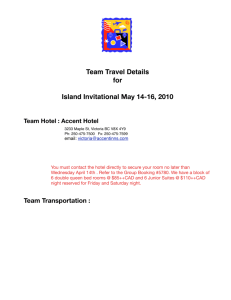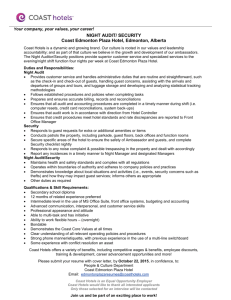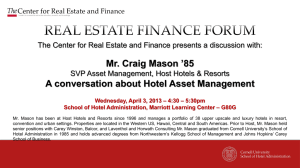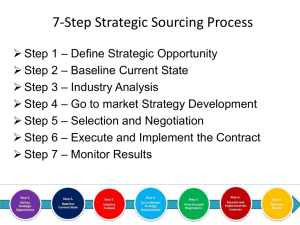AOS 2 Unit 3 Practice SAC
advertisement
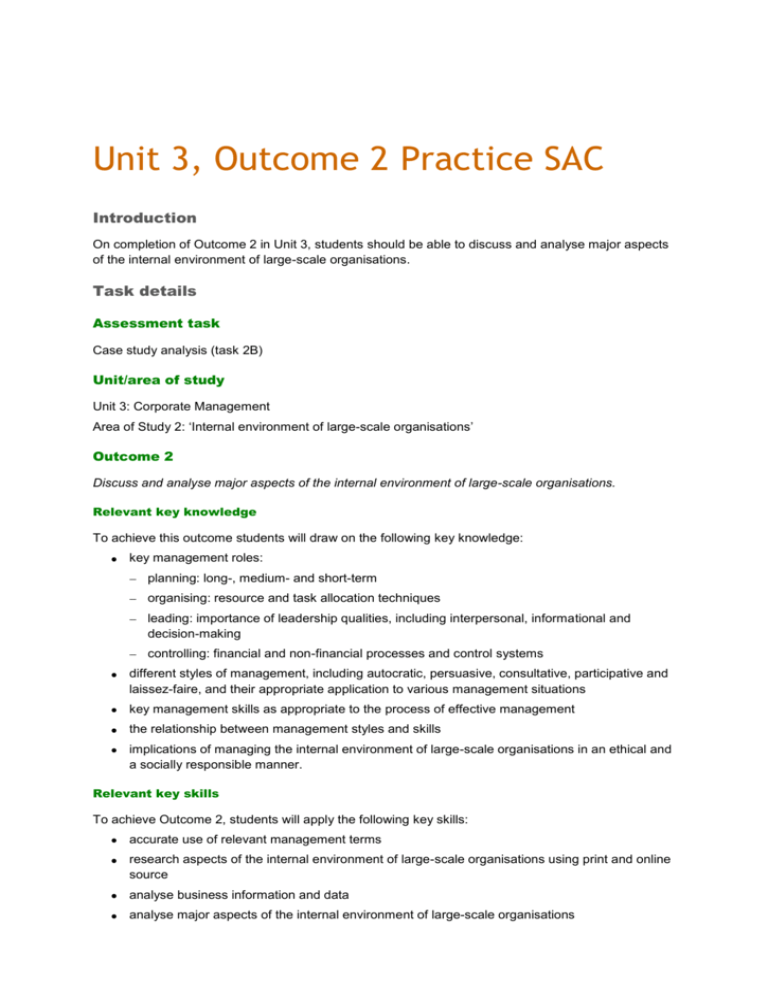
Unit 3, Outcome 2 Practice SAC Introduction On completion of Outcome 2 in Unit 3, students should be able to discuss and analyse major aspects of the internal environment of large-scale organisations. Task details Assessment task Case study analysis (task 2B) Unit/area of study Unit 3: Corporate Management Area of Study 2: ‘Internal environment of large-scale organisations’ Outcome 2 Discuss and analyse major aspects of the internal environment of large-scale organisations. Relevant key knowledge To achieve this outcome students will draw on the following key knowledge: key management roles: planning: long-, medium- and short-term organising: resource and task allocation techniques leading: importance of leadership qualities, including interpersonal, informational and decision-making controlling: financial and non-financial processes and control systems different styles of management, including autocratic, persuasive, consultative, participative and laissez-faire, and their appropriate application to various management situations key management skills as appropriate to the process of effective management the relationship between management styles and skills implications of managing the internal environment of large-scale organisations in an ethical and a socially responsible manner. Relevant key skills To achieve Outcome 2, students will apply the following key skills: accurate use of relevant management terms research aspects of the internal environment of large-scale organisations using print and online source analyse business information and data analyse major aspects of the internal environment of large-scale organisations apply knowledge and concepts to practical and/or simulated situations. Instructions and conditions In completing the following assessment task you should demonstrate an understanding of the key knowledge for Outcome 2 and your ability to plan, organise and undertake written communication. Answer all questions in this answer book. The marks for each question are indicated after each question. Conditions: Closed book Reading time: 5 minutes Time allowed: 60 minutes Marks allocated: 30 marks Case study: Hanley Hotels Limited Hanley Hotels Limited is a large international five-star chain of hotels and eco-resorts. In Australia, the company has operated hotels in all the major capital cities for the past 25 years. In the mid-2000s Hanley Hotels decided to diversify its operations into eco-tourism. This resulted in the building of three eco-resorts, one on the Barrier Reef, one in the Northern Territory (Kakadu National Park) and the other in Western Australia at Cable Beach, Broome. The eco-resorts have been built and are run based on a totally environmentally sustainable approach that incorporates the use of eco-aware technology, including low-emission clean-burning diesel generators, low-power light bulbs, solar hotwater heating, a waste management system, and systems for collecting and using rainwater and the desalination of seawater. The company employs more than 1800 staff in Australia and prides itself on its commitment to training young people to high standards in the hospitality and tourism industry. Hanley Hotels’ mission is: ‘To be the world’s leading five-star hotel and eco-resorts chain. We aim to meet and exceed the expectations of our guests in quality service and all-round accommodation experience’. Our motto is: “To provide the ultimate holiday and accommodation experience for our valued guests”.’ The parent company, Hanley Hotels Limited, located in Zurich, Switzerland decided it was time for a review of the entire Australian operations. The company employed Hans Fritter, a specialist in hotel and resort management, to assess the operation. His report, which was based on reviewing operational data, talking with staff, management and guests, and his own observations of hotel and eco-resort operations, highlighted the following points: The profitability of the Gold Coast Hanley Hotel was a problem. In 2009 its profit was 20% lower than in 2008. When looking at staff turnover figures for the entire Australian operation (hotels and ecoresorts), there was an overall increase of 35% in 2009. However, further examination revealed that the staff turnover at the eco-resorts was far less (10%). Discussions with the major capital city hotel staff revealed that they felt they were being ignored and not appreciated by management. It was also found that rival hotels in the capital cities had been headhunting Hanley Hotels’ highly regarded and trained staff, offering them substantially more generous employment packages. Occupancy rates varied. The Gold Coast Hanley Hotel was the worst performer in the Australian operation, whereas the occupancy rates at the three eco-resorts had risen to full capacity with guests wanting to be placed on a waiting list in case of cancellations. The introduction of the Total Quality Management Program had been implemented successfully at all hotel and eco-resorts, except for the Gold Coast hotel. Further examination revealed that management at this hotel felt threatened by the creation of work teams and the adoption of a participative management style. There was an ongoing dispute with the Liquor, Hospitality and Miscellaneous Workers’ Union at the city hotels relating to wages and conditions for staff. As a consequence, staff had been involved in stop-work meetings. There did not seem to be any issues noted for the eco-resorts. Harry Moore is currently the General Manager of the Gold Coast Hanley Hotel. Commencing as a hotel porter at 15 years of age, and without completing any formal management training, he has worked his way up the organisation’s hierarchy to now hold this top position. The majority of Harry’s working life has been spent working under a multi-layered hierarchical structure. Many of his staff commented to Hans that Harry seemed to relish the status and prestige of the position of General Manager. Hans found it difficult to interview Harry as he was often absent, spending long weekends at his beach house at Bribie Island and leaving strict instructions not to be disturbed. Harry’s approach now seems to be distant, with middle managers, such as Jeremy Hall, basically being left to run their departments as they see fit. Jeremy Hall, the Food and Beverage Manager at the Gold Coast Hanley Hotel, is in his late 30s. He has a tertiary hospitality qualification. He has made a significant effort to resist incorporating any participative management practices into his department. Jeremy believes that workers in his department should follow his orders, without question. At the beginning of each shift he holds a briefing session to give instructions and allocate tasks, but is unresponsive to questions from staff members. A few of the younger hospitality trained staff in his department have started to resent his dictatorial style. Hans found that staff turnover in Jeremy’s department was very high. When questioned by Hans, Jeremy’s reply was that far too much time was wasted consulting and talking with staff. He argued that in his position as manager, he knew best, and therefore workers should follow his orders and simply get on with their jobs. Since being appointed as the General Manager of the three eco-resorts in 2008, Jenny Kelly has approached her role in an entirely different manner. She appointed a Resort Manager for each resort, suggesting to them that they organise their staff into departments and teams, based on functions such as food and beverage, housekeeping, activities—indoor/outdoor. Each work group was given specific goals and their performance was to be appraised against achievement of these goals. Jenny requested that the Resort Managers hold department meetings on a weekly basis and encourage staff to have input into these meetings. Jenny has emphasised that she values the advice of staff in terms of how the teams, departments and resorts are operating. The shop steward for the Liquor, Hospitality and Miscellaneous Workers’ Union, Alex Whitehorse, representing the workers at the Gold Coast hotel, told Hans that the situation with regard to the negotiation of the new pay and working conditions was becoming serious. Hotel management had refused to deal with the union when trying to negotiate a collective agreement or discuss whether their current agreement had been changed to align with the new National Employment Standards. Alex was concerned that workers would not be in a position to negotiate on an equal basis with management and could be forced to work longer hours for no additional pay. Alex warns that if management does not start to show a greater interest in negotiating a fair set of work conditions, then a walkout by staff is highly probable. Questions Question 1 Identify the management style currently being used by two of the following managers at Hanley Hotels Limited. Explain two features of each management style. i, Harry Moore ii. Jeremy Hall iii. Jenny Kelly 3 + 3 = 6 marks Question 2 On the recommendation of Hans Fritter, a new General Manager is to be appointed to run the Gold Coast Hanley Hotel. Outline a process or series of steps that the new General Manager might use to address one of the problems facing the organisation. Identify the particular problem, describe and discuss how the General Manager in this particular case would apply these steps to resolve the problem identified. 2 + 3 = 5 marks Question 3 Describe two management roles for either: i. the new General Manager of the Gold Coast Hanley Hotel, OR ii. the General Manager of the three eco-resorts. 2 + 2 = 4 marks Question 4 Identify and explain two management skills that you believe the new General Manager of the Gold Coast Hanley Hotel will need in order to manage the current challenges facing the business. 2 + 2 = 4 marks Question 5 Having analysed the current situation at the Gold Coast Hanley Hotel, recommend a management style that you believe would be the most appropriate to run this five-star hotel effectively. Justify your answer with reference to the case study. 1 + 2 = 3 marks Question 6 Describe two relevant criteria for assessing whether the new General Manager of the Gold Coast Hanley Hotel OR the General Manager of the three eco-resorts, has been effective in performing their role. 1 + 1 = 2 marks Question 7 Explain why the ‘planning’ role of management is important. 2 marks Question 8 Describe a situation where using the following management styles would be appropriate. a. laissez-faire b. autocratic 1 + 1 = 2 marks Question 9 Discuss the initiatives that have been introduced by Hanley Hotels Limited that would be regarded as socially responsible operations. 2 marks Total: 30 marks Suggested answers Question 1 Identify the management style currently being used by two of the following managers at Hanley Hotels Limited. Explain two features of each management style. (3 + 3 = 6 marks) i. Harry Moore Laissez-faire—little direction is being given by Harry as he appears to be disconnected from the business and its objectives. This has resulted in his management team now determining their own objectives, solving their own problems and making their own decisions. ii. Jeremy Hall Autocratic: control and authority is centralised with an emphasis on task and process the manager has a belief or perception that money is the main motivator for his employees’ work performance centralised decision-making, with decisions or orders imposed on, and directions given to, subordinates little or no importance is placed on the contribution of employees—decision-making and operations reflect the ideas, beliefs and values of the manager only communication is centralised, with a strict top-down or hierarchical chain-of-command approach. iii. Jenny Kelly Participative: this style is characterised by decentralised control and authority and employee involvement in decision-making, the development of strategies and the implementation of solutions employees participate in setting goals and management values the suggestions of employees the orientation or focus is towards people, ensuring that employees are satisfied and productive motivation is based on job satisfaction decision-making is decentralised with management/teams sharing in decisionmaking/problem-solving tasks value is placed on the contribution of employees to the overall performance of the organisation communication is open and feedback is sought and valued. Question 2 On the recommendation of Hans Fritter, a new General Manager is to be appointed to run the Gold Coast Hanley Hotel. Outline a process or series of steps that the new General Manager might use to address one of the problems facing the organisation. Identify the particular problem, describe and discuss how the General Manager in this particular case would apply these steps to resolve the problem identified. (2 + 3 = 5 marks) To gain full marks, students must outline the systematic approach to problem-solving and use one problem in their answer. The following answer focuses on the problem of staff turnover. Identify the problem(s) and define the objective(s)—a dramatic increase in staff turnover of 35% in 2009. 1 Gather the necessary information to establish the cause of the problem(s), including whether the increase in staff turnover is occurring in all departments or particular departments, the number of exit interviews being undertaken, and the industry average for staff turnover. 2 Develop alternative solutions: do nothing about the problem conduct a training and development course for management to ensure they all adopt the participative management style. 3 Analyse the alternatives. Doing nothing will only result in the problem escalating, whereas the second option is to proactively bring about a positive change. 4 Choose an alternative and implement it. The best outcome would be achieved by a training and development course being undertaken by various managers within the organisation. 5 Evaluate the implementation. This could be carried out by comparing the staff turnover rates for 2010 and 2011. If they have decreased, then this would indicate success based on a quantitative measure. In addition, conducting a staff attitudinal survey would provide qualitative feedback. Question 3 Describe two management roles for either: i. the new General Manager of the Gold Coast Hanley Hotel, OR ii. the General Manager of the three eco-resorts. (2 + 2 = 4 marks) Responses for either the new General Manager of the Gold Coast hotel or the General Manager of the eco-resorts should include any two of the following management roles. Planning Organising Leading Controlling Strategic planning (L/T) Strategic direction Organisation-wide objectives/goals High levels of uncertainty/risk Involves developing a systematic approach to coordinate human, material, financial and informational resources to achieve corporate goals and objectives Establishing organisational structure Overall accountability Ensuring goals and objectives are met Establishing overall performance standards Leads—role model Influences Motivates Visionary Establishes corporate atmosphere Question 4 Identify and explain two management skills that you believe the new General Manager of the Gold Coast Hanley Hotel will need in order to manage the current challenges facing the business. (2 + 2 = 4 marks) Any two management skills from the following list could be explained: communication delegation negotiation decision-making/problem-solving team leadership time management stress management emotional intelligence. To gain full marks the skills need to be described and explained with reference to the General Manager’s management of the challenges. Question 5 Having analysed the current situation at the Gold Coast Hanley Hotel, recommend a management style that you believe would be the most appropriate to run this five-star hotel effectively. Justify your answer with reference to the case study. (1 + 2 = 3 marks) Participative or consultative—students need to justify their choice of style by referring to specific details in the case study that require the characteristics of that style to best manage the hotel. Question 6 Describe two relevant criteria for assessing whether the new General Manager of Gold Coast Hanley Hotel OR the General Manager of the three eco-resorts, has been effective in performing their role. (1 + 1 = 2 marks) Any two of the criteria listed below for each manager should be included in the response. General Manager Gold Coast hotel: decrease in staff turnover decrease in customer complaints increase in sales revenue successful implementation of a change in management style to participative resolution of conflict with Hospitality and Tourism Workers’ Union increased level of staff satisfaction. General Manager of eco-resorts: increased level of staff satisfaction higher occupancy rates increase in sales revenue successful implementation of eco-friendly practices profitability of resort. Question 7 Explain why the ‘planning’ role of management is important. (2 marks) Planning is important because at a strategic planning level it establishes the overall strategic direction and organisation-wide objectives for long-term, high-risk decisions. Tactical planning is important as it ensures that the organisation-wide direction is being planned for implementation at the departmental or divisional level on a medium-term time frame. Similarly, operational-level planning ensures that specific tasks are being planned and undertaken in the short-term. Planning is the commencement of the cycle whereas controlling is linked to ensuring that the objectives and actions planned for are in fact achieved. If not, then further planning will be required. Question 8 Describe a situation where using the following management styles would be appropriate. (1 + 1 = 2 marks) a. laissez-faire The laissez-faire style is appropriate in a creative environment, for example in an advertising agency or multimedia company where once the overall guidelines are set, the employees can work under their own direction. b. autocratic The autocratic style is appropriate in high-risk situations that require a high degree of control, for example during disaster recovery operations or in a situation where workers need constant direction and to be told what to do and/or do not want to rely on their own judgement. Question 9 Discuss the initiatives that have been introduced by Hanley Hotels Limited that would be regarded as socially responsible operations. (2 marks) Initiatives relating to socially responsible operations include: diversifying their operations to include three eco-resorts adopting environmentally sustainable practices, including: – low-emission clean-burning diesel generators and low-power light bulbs – solar hot-water heating – a waste management system – systems for collecting and using rainwater and for the desalination of seawater.


